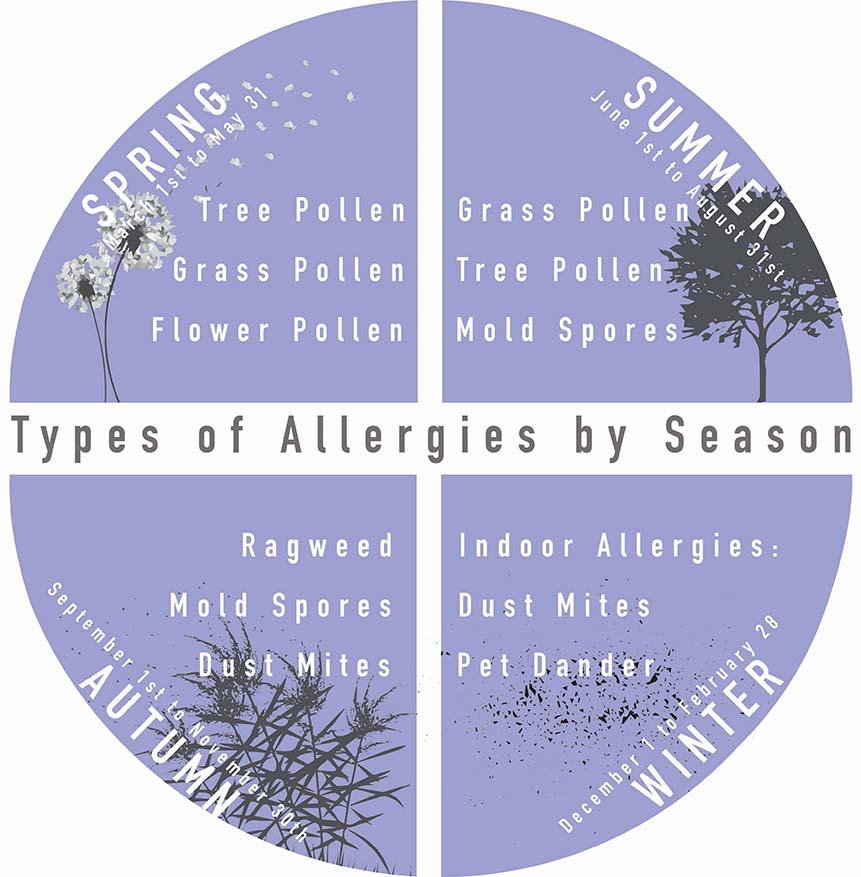Seasonal Allergies Are Here
How to alleviate symptoms before they take over
Spring has sprung and so have seasonal allergies. It’s that time of year again when everything is blossoming and for people who have seasonal allergies that means runny noses, sore throats and sneezing.
Many seasonal allergy sufferers also experience fatigue and general soreness that can make concentrating on schoolwork difficult. Luckily there are some tips and tricks to dealing with seasonal allergies.
Johanna Van Dam, who suffers from severe seasonal allergies this time of the year, said, “An air purifier will change your life. It needs to run all the time and have one in every single room of your house.” Unfortunately, not everybody can afford an air purifier let alone putting one in every room of their home.

Natalie Grimm (right), a nursing student, talks about the benefits of bee pollen.
However, even little changes in your life can make a big difference when you have seasonal allergies. Nursing student, Natalie Grimm, said that taking three tablespoons of bee pollen can help. “But you have to make sure it’s local,” Grimm says.
Perhaps some of the best advice is to go see your doctor. “I know it sucks but you really have to see your doctor,” Neil Mamaril, a nursing student said, “because meds are going to affect you in a myriad of ways and you really have to get a prescription.”

You can always take over-the-counter medications as well such as Allegra, Zyrtec or Claritin. In addition to allergy medications, some allergy sufferers use nasal allergy sprays, such as Flonase, or get allergy shots or injections.
Allergy injections, such as Xolair, are typically for people who suffer from allergic asthma. Allergic asthma is asthma that is triggered by exposure to your allergen. Allergy injections are taken every two or four weeks and are usually administered in the back of both arms.
There are also some things you should not be doing during allergy season. It is advised by allergy sufferers and nursing students alike that you avoid contact with your allergen whenever possible. Depending on what allergies you have that can mean not mowing the lawn, avoiding flowers and other plants and even staying indoors.

Staying indoors or completely avoiding your allergen is not an option for everybody, however, there are some other things you should avoid. “Don’t drink alcohol if you’re taking allergy medication,” says Mamaril. The reason for this is that some allergy medications can cause drowsiness and the addition of alcohol can lead to a sedated state or unconsciousness.
It is also advised that you do not skip your allergy medication. People have been known to experience seasonal allergies without experiencing the symptoms commonly associated with those allergies. It is recommended that you take allergy medication prior to contact with your known allergens, as this can be a preventative measure in reducing allergy symptoms.
Similar to the weather, you can also track the pollen count in your area. Staying up to date on the pollen count is a good way to know how much your allergies could affect you on any given day. You can track pollen activity in your area by using apps such as Allergy Alert or WebMD Allergy, available on the App Store and Google Play.

What interests you about journalism?
I have a passion for storytelling and journalism is one platform that I use to explore that passion. I do a...

What interests you about journalism?
I think what interests me most about journalism is the opportunity to learn about other people and to feel...

What are you doing when you aren’t at The Clipper?
When I’m not at The Clipper or work I’m at home with my three cats, dog and wife playing...










